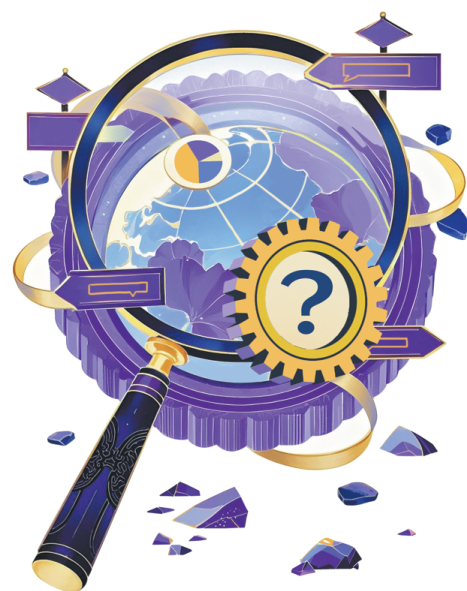
MA XUEJING/CHINA DAILY
It is a propitious moment to assess the state and prospects of Sino-US relations, the world's two largest economies as well as large military powers. It might seem cliched, but nothing is more important for peace and prosperity in the world than cooperation between the US and China.
To many in China, the US is hyping the "China threat" theory and thwarting the country's historic, rightful development by policies of containment: sanctions, tariffs, alliances and arms sales to Taiwan.
To many in the US, China has become more "aggressive" abroad and more "repressive" at home. What is especially disquieting to US elites is their perception that China is backing Russia in Ukraine.
With respect to US politics, Trump campaigned, in part, on a tough-on-China platform. One can usually forecast a US president's foreign policy by assessing the background of those whom he picks for top foreign policy positions — and Trump's Secretary of State-designate, Marco Rubio, and National Security Adviser-designate, Mike Waltz, are both historical hawks on China. Yet, going deeper, this truism is less true for Trump, who has a history of flouting expert advice and going with his gut instincts. In fact, Trump himself professes admiration for President Xi Jinping, prides himself on avoiding new wars, and loves to make new deals. This provides an opening for improving US-China relations.
With respect to China's economy, the readout of the Central Economic Work Conference is telling — using stimulus-signaling language not seen since the global financial crisis in 2009, implicitly recognizing that China's economy needs to "vigorously boost consumption, improve investment efficiency, and expand domestic demand on all fronts". It stresses "boosting domestic demand, especially consumer demand" and calls for adopting a more proactive fiscal policy, implementing a moderately loose monetary policy with reductions in the reserve requirement ratio and interest rates to ensure ample liquidity, and moves to stabilize real estate and stock markets.
China says that it still welcomes foreign investments and that it still will be the engine of global growth. This provides a motivation, if not a necessity, for improving China-US relations.
With respect to the world, events overwhelm expectations. The toppling of the Syrian government, after over five decades of al-Assad family rule, shocked almost everyone.
Assad had been backed strongly for over a decade by a powerful Russia and an ascending Iran. Then, in less than two weeks, Assad was gone, chased out by barely known, seemingly ragtag rebel groups. But actually, multiple factors were drivers, triggered by Hamas's horrific killing and kidnapping of some 1,500 Israeli civilians in October 2023 and subsequently Israel's furious, devastating and relentless attacks against Hamas in Gaza and Hezbollah in Lebanon, and even against their backer, Iran. It says something about our chaotic world when Israel, in 48 hours, destroys 80 percent of the advanced assets of the massive Syrian army and air force, from missiles, fighter jets and drones to munitions plants, research centers and chemical weapons — and sinks the entire Syrian navy in one night — and the astounding story wasn't even the main headline in the international press.
In Europe, there is deep concern over troops from the Democratic People's Republic of Korea having entered the Russia-Ukraine conflict and over China's perceived backing of Russia, despite China's repeated clarifications. There is also concern that low-cost, good-quality Chinese EV vehicles would undermine the European automotive industry.
Meanwhile, US allies in Europe and Asia worry about what Trump may do to them, from imposing stiff tariffs to demanding they spend more on their own defense.
While just about everyone in Washington advocates tough-on-China policies, Trump himself is not beholden to any of them. He is the boss and he is ready and eager to make deals that he perceives are good for the US and burnish his image. What others call Trump's policy flip-flops his ignorance of basic principles, and declare it a weakness, Trump himself calls his personal unpredictability, a strength. This is why when Trump says that he respects President Xi and that Xi is his friend, he is laying the groundwork for potential deals.
It takes no PhD in economics to know that everyone loses when global economies are decoupled.
We would best settle in for a period of uncertainty and volatility in China-US relations. My three-imperative prescription for China-US relations remains simple: First, avoid exacerbating areas of conflict or contention. Second, find common ground for joint action: interdicting dangerous drugs, planning for pandemics, mitigating AI risks, and controlling climate change. Third, give time a chance to lower the heat by passing quietly without incident.
Just three points to follow — for US citizens, for Chinese citizens, for the people of the world. If only it all worked this way.
The author is chairman of The Kuhn Foundation and creator/host of Closer To Truth on science and philosophy, and a recipient of the China Reform Friendship Medal. The views don't necessarily reflect those of China Daily.
If you have a specific expertise, or would like to share your thought about our stories, then send us your writings at opinion@chinadaily.com.cn, and comment@chinadaily.com.cn.